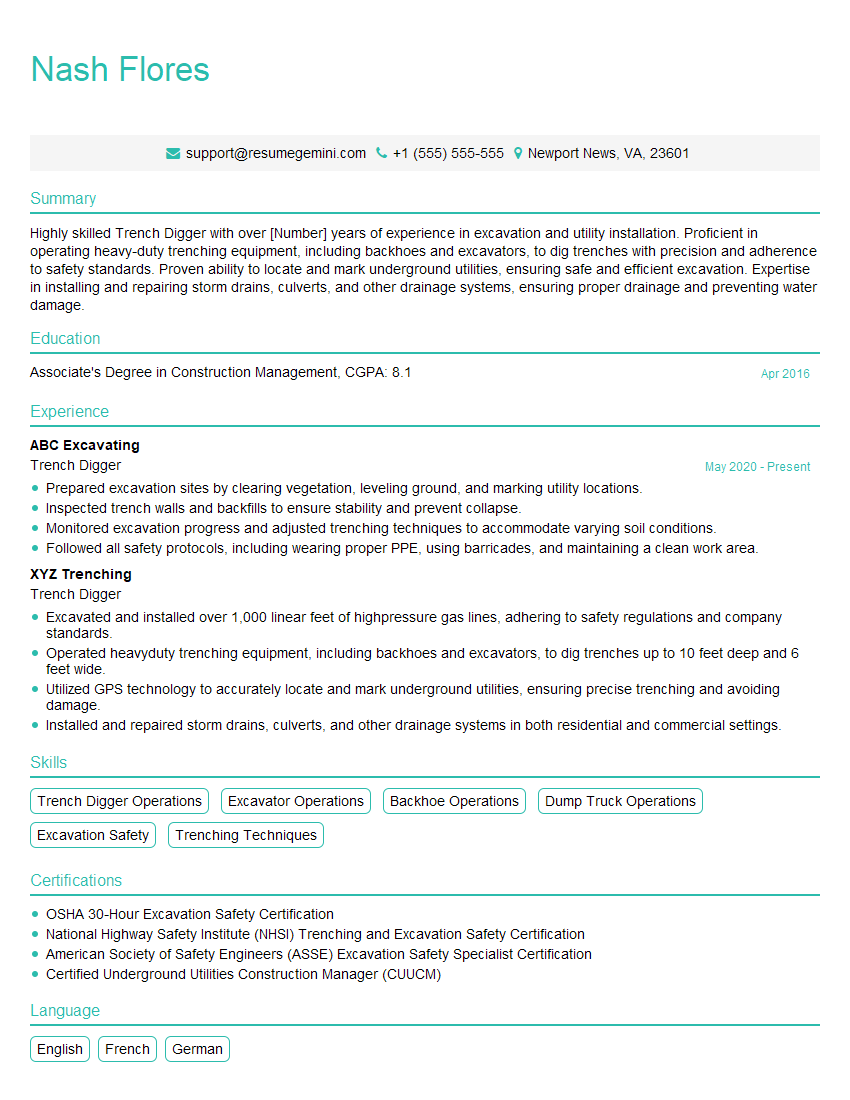Are you a seasoned Trench Digger seeking a new career path? Discover our professionally built Trench Digger Resume Template. This time-saving tool provides a solid foundation for your job search. Simply click “Edit Resume” to customize it with your unique experiences and achievements. Customize fonts and colors to match your personal style and increase your chances of landing your dream job. Explore more Resume Templates for additional options.

Nash Flores
Trench Digger
Summary
Highly skilled Trench Digger with over [Number] years of experience in excavation and utility installation. Proficient in operating heavy-duty trenching equipment, including backhoes and excavators, to dig trenches with precision and adherence to safety standards. Proven ability to locate and mark underground utilities, ensuring safe and efficient excavation. Expertise in installing and repairing storm drains, culverts, and other drainage systems, ensuring proper drainage and preventing water damage.
Education
Associate’s Degree in Construction Management
April 2016
Skills
- Trench Digger Operations
- Excavator Operations
- Backhoe Operations
- Dump Truck Operations
- Excavation Safety
- Trenching Techniques
Work Experience
Trench Digger
- Prepared excavation sites by clearing vegetation, leveling ground, and marking utility locations.
- Inspected trench walls and backfills to ensure stability and prevent collapse.
- Monitored excavation progress and adjusted trenching techniques to accommodate varying soil conditions.
- Followed all safety protocols, including wearing proper PPE, using barricades, and maintaining a clean work area.
Trench Digger
- Excavated and installed over 1,000 linear feet of highpressure gas lines, adhering to safety regulations and company standards.
- Operated heavyduty trenching equipment, including backhoes and excavators, to dig trenches up to 10 feet deep and 6 feet wide.
- Utilized GPS technology to accurately locate and mark underground utilities, ensuring precise trenching and avoiding damage.
- Installed and repaired storm drains, culverts, and other drainage systems in both residential and commercial settings.
Certificates
- OSHA 30-Hour Excavation Safety Certification
- National Highway Safety Institute (NHSI) Trenching and Excavation Safety Certification
- American Society of Safety Engineers (ASSE) Excavation Safety Specialist Certification
- Certified Underground Utilities Construction Manager (CUUCM)
Languages
- English
- French
- German
Career Expert Tips:
- Select the ideal resume template to showcase your professional experience effectively.
- Master the art of resume writing to highlight your unique qualifications and achievements.
- Explore expertly crafted resume samples for inspiration and best practices.
- Build your best resume for free this new year with ResumeGemini. Enjoy exclusive discounts on ATS optimized resume templates.
How To Write Resume For Trench Digger
- Highlight your experience in operating heavy-duty trenching equipment and your ability to dig trenches with precision.
- Emphasize your proficiency in using GPS technology to locate and mark underground utilities.
- Showcase your experience in installing and repairing storm drains, culverts, and other drainage systems.
- Demonstrate your commitment to safety by mentioning your adherence to safety protocols and your attention to detail when inspecting trench walls and backfills.
- Consider including any certifications or training you have received in trench digging or excavation safety.
Essential Experience Highlights for a Strong Trench Digger Resume
- Operate heavy-duty trenching equipment, including backhoes and excavators, to dig trenches up to 10 feet deep and 6 feet wide.
- Utilize GPS technology to accurately locate and mark underground utilities, ensuring precise trenching and avoiding damage.
- Install and repair storm drains, culverts, and other drainage systems in both residential and commercial settings.
- Prepare excavation sites by clearing vegetation, leveling ground, and marking utility locations.
- Inspect trench walls and backfills to ensure stability and prevent collapse.
- Monitor excavation progress and adjust trenching techniques to accommodate varying soil conditions.
- Follow all safety protocols, including wearing proper PPE, using barricades, and maintaining a clean work area.
Frequently Asked Questions (FAQ’s) For Trench Digger
What is a trench digger?
A trench digger is a heavy-duty machine used to excavate trenches in the ground. Trench diggers are commonly used for installing underground utilities, such as gas lines, water lines, and electrical cables.
What are the different types of trench diggers?
There are two main types of trench diggers: wheel trenchers and chain trenchers. Wheel trenchers use a rotating wheel with teeth to cut through the ground, while chain trenchers use a continuous chain of teeth to cut through the ground.
What are the safety precautions that should be taken when operating a trench digger?
When operating a trench digger, it is important to wear proper safety gear, such as a hard hat, safety glasses, and gloves. It is also important to be aware of your surroundings and to avoid digging near underground utilities.
What are the different applications of trench diggers?
Trench diggers are used for a variety of applications, including installing underground utilities, digging foundations for buildings, and excavating for irrigation systems.
What are the advantages of using a trench digger?
Trench diggers are a more efficient and cost-effective way to excavate trenches than manual labor. Trench diggers can also dig trenches more quickly and accurately than manual labor.
What are the disadvantages of using a trench digger?
Trench diggers can be expensive to purchase and maintain. Trench diggers can also be difficult to operate, and they require specialized training.
What are the different factors to consider when choosing a trench digger?
When choosing a trench digger, it is important to consider the size of the trenches that you need to dig, the type of soil that you will be digging in, and the budget that you have available.